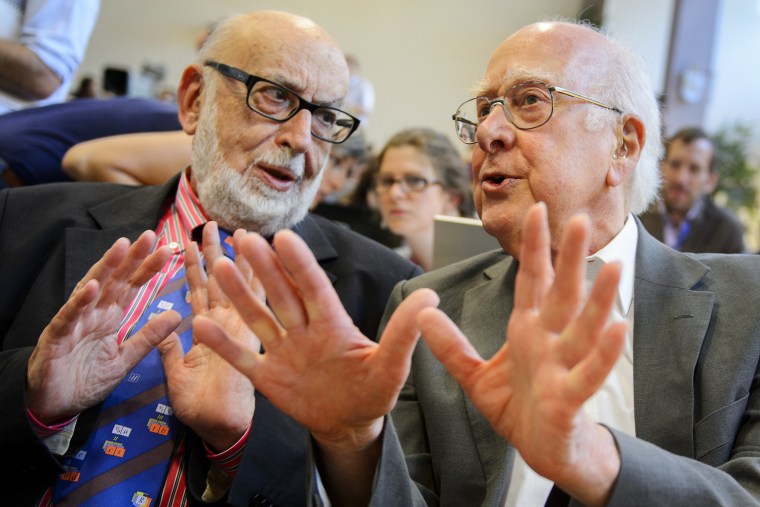Two theorists who predicted the existence of the subatomic Higgs boson almost 50 years ago — and were proven right just last year — won the Nobel Prize for physics on Tuesday.
British physicist Peter Higgs and Belgian physicist Francois Englert shared the honors, announced in Stockholm at the Royal Swedish Academy of Sciences.
"This year's prize is about something small that makes all the difference," said Staffan Normark, the academy's permanent secretary.
What is the Higgs boson?
It was Higgs, 84, who lent his name to the particle that sparked a multibillion-dollar quest. The 80-year-old Englert and his late colleague, Robert Brout, proposed the particle's existence independently in 1964.
Fermilab physicist Leon Lederman gave the Higgs boson its better-known nickname — "the God Particle" — because of its fundamental role in the mechanisms governing the cosmos. Today, physicists almost universally regret that nickname because it wrongly carries suggestions of the supernatural. Lederman himself later said he really meant to call it the "Goddamn Particle" because it proved so elusive.
The Higgs boson is the last fundamental particle predicted by one of physics' most successful theories, the Standard Model, and is thought to play a part in giving mass to some subatomic particles (such as the W-boson) but not others (such as the photon).
"If it wasn't there, we wouldn't be here," Higgs once told The Guardian.
Detecting the Higgs was the primary goal of the $10 billion Large Hadron Collider, built by Europe's CERN particle physics lab on the Swiss-French border.
Physicists finally reported the particle's discovery in July 2012, and its status as "a" Higgs boson — if not "the" Higgs boson — was confirmed this March.
The Nobel citation said the physics prize was given "for the theoretical discovery of a mechanism that contributes to our understanding of the origin of mass of subatomic particles, and which recently was confirmed through the discovery of the predicted fundamental particle, by the ATLAS and CMS experiments at CERN's Large Hadron Collider."
Reactions from scientists
The achievement was considered the odds-on favorite for Nobel recognition this year — but mystery swirled over who exactly would get the prize. At least three other physicists were involved in setting the theoretical framework for the particle's existence in 1964, but the traditions set for the scientific Nobel Prizes called for no more than three living individuals to be honored.
The choice was further complicated by the fact that thousands of physicists contributed to the discovery at the Large Hadron Collider. In the end, the Nobel committee awarded the prize only to Higgs and Englert. Higgs is a professor emeritus at the University of Edinburgh, while Englert is a professor emeritus at the Universite Libre de Bruxelles who also holds academic appointments at Tel Aviv University and Chapman University.
The Nobel committee's announcement was delayed for an hour — which drew a joking reaction from Englert. "I thought first I had to make a very low festivity, because I didn't see any announcement," he told reporters. "But now I'm very happy."
Normark declined to explain the delay. He also said the committee couldn't get in touch with Higgs directly to inform him of the prize. "Actually, we tried quite hard to get a hold of him, but of all the numbers we tried, he didn't answer," Normark said. The committee had to send him an email instead.
"I am overwhelmed to receive this award and thank the Royal Swedish Academy," Higgs said in a statement issued on his behalf by the University of Edinburgh. "I would also like to congratulate all those who have contributed to the discovery of this new particle and to thank my family, friends and colleagues for their support. I hope this recognition of fundamental science will help raise awareness of the value of blue-sky research."
CERN's director-general, Rolf Heuer, congratulated the laureates. "The discovery of the Higgs boson at CERN last year, which validates the Brout-Englert-Higgs mechanism, marks the culmination of decades of intellectual effort by many people around the world,” Heuer said in a statement.
What comes next?
The Swedish academy said that even though discovering the Higgs was "a great achievement" in the effort to complete physics' Standard Model, that theory is "not the final piece in the cosmic puzzle." For example, the model does not account for gravity, nor for mysterious dark matter. Englert said future research, at the LHC and elsewhere, will have to focus on dark matter as well as other way-out hypotheses such as supersymmetry and quantum gravity.
The Large Hadron Collider is currently shut down for maintenance and upgrades. "We are switching on the LHC again beginning in 2015, at a higher energy," Heuer told reporters at CERN's headquarters near Geneva. "And when you go to higher energy, you hope for new discoveries."

Higgs and Englert will share the $1.2 million prize well before that, at an awards ceremony in Stockholm in December.
Nobel Prizes have been awarded since 1901, in accordance with the late Swedish industrialist Alfred Nobel's will. Tuesday's announcement came a day after two Americans and a German researcher won the Nobel for medicine or physiology for their study of how hormones, enzymes and other key substances are transported within cells. The prizes for chemistry, peace, economics and literature are to be announced by other prize juries this week and next.
More about the Higgs quest:
- The Higgs boson explained in 3 minutes
- NBC News archive on the Higgs boson
- Special report on the Large Hadron Collider
Alan Boyle is NBCNews.com's science editor. Connect with the Cosmic Log community by "liking" the NBC News Science Facebook page, following @b0yle on Twitter and adding +Alan Boyle to your Google+ circles. To keep up with NBCNews.com's stories about science and space, sign up for the Tech & Science newsletter, delivered to your email in-box every weekday. You can also check out "The Case for Pluto," my book about the controversial dwarf planet and the search for new worlds.
